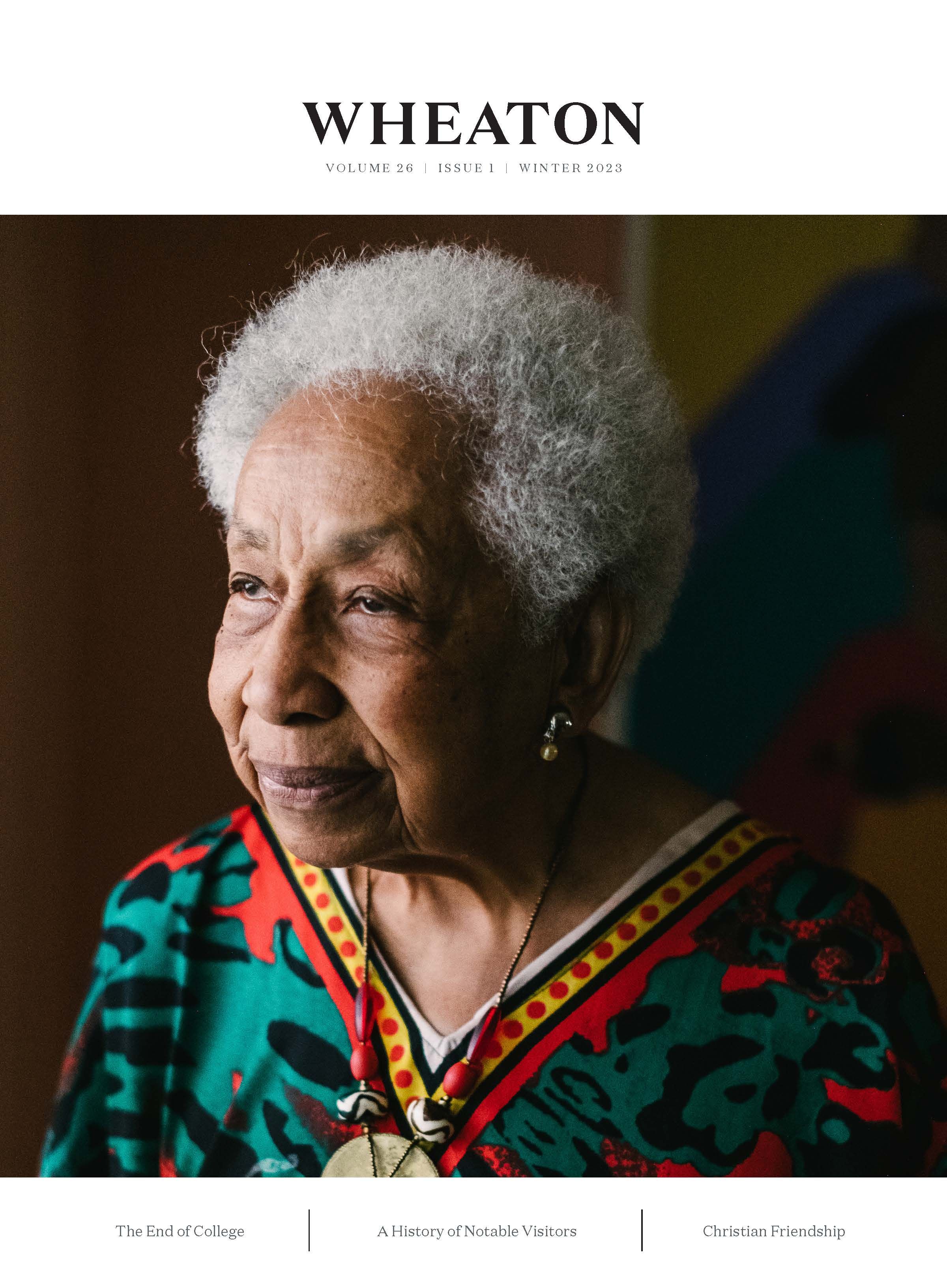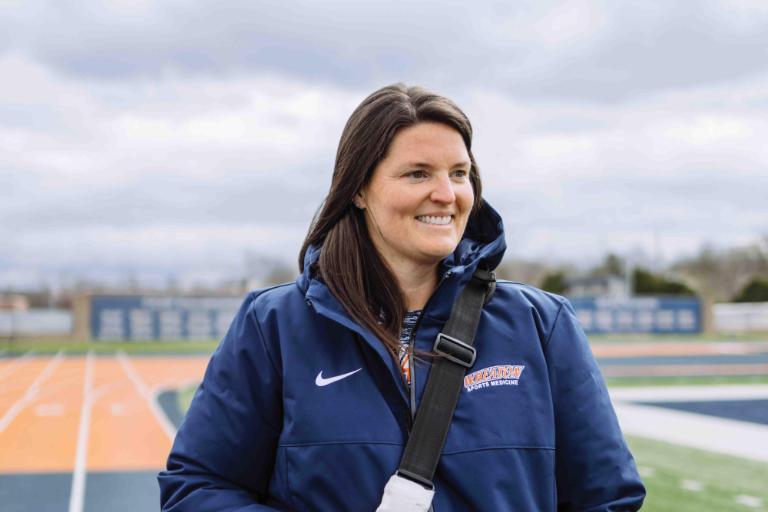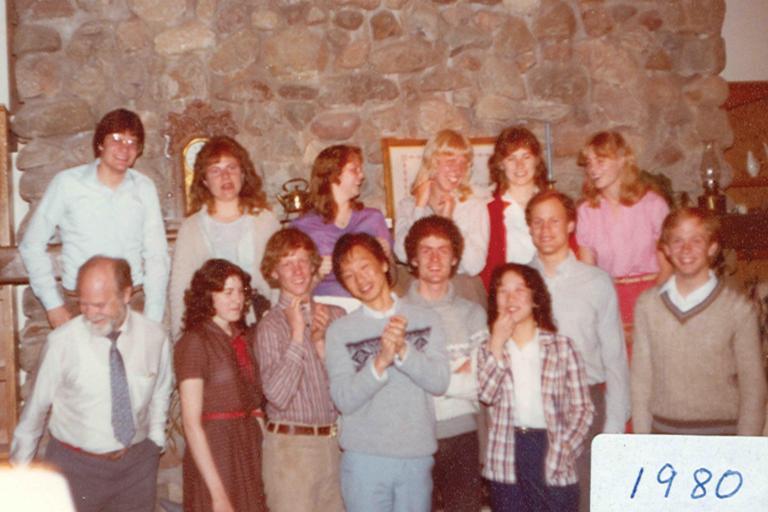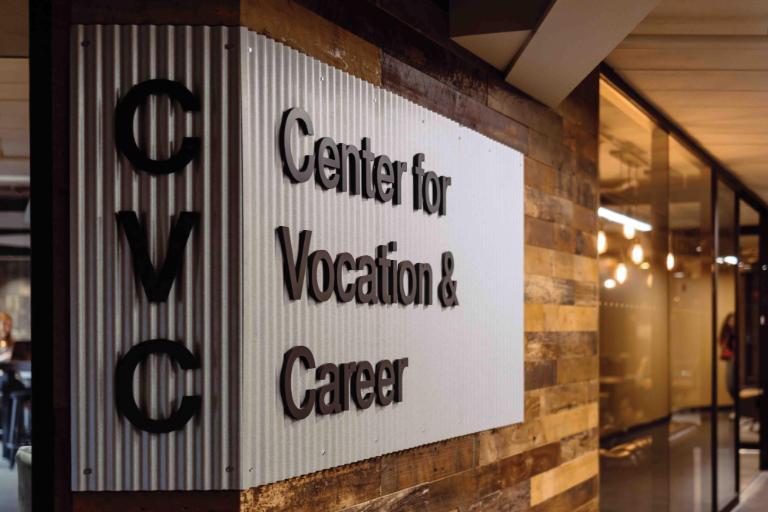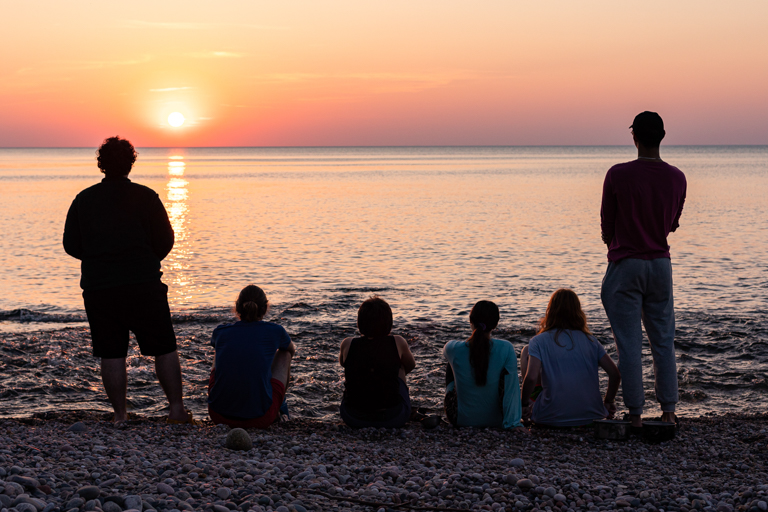The End of College
Students today need more than knowledge and preparation for career.
Words: Charles V. Audino M.A. ’16
Photos: Tony Hughes
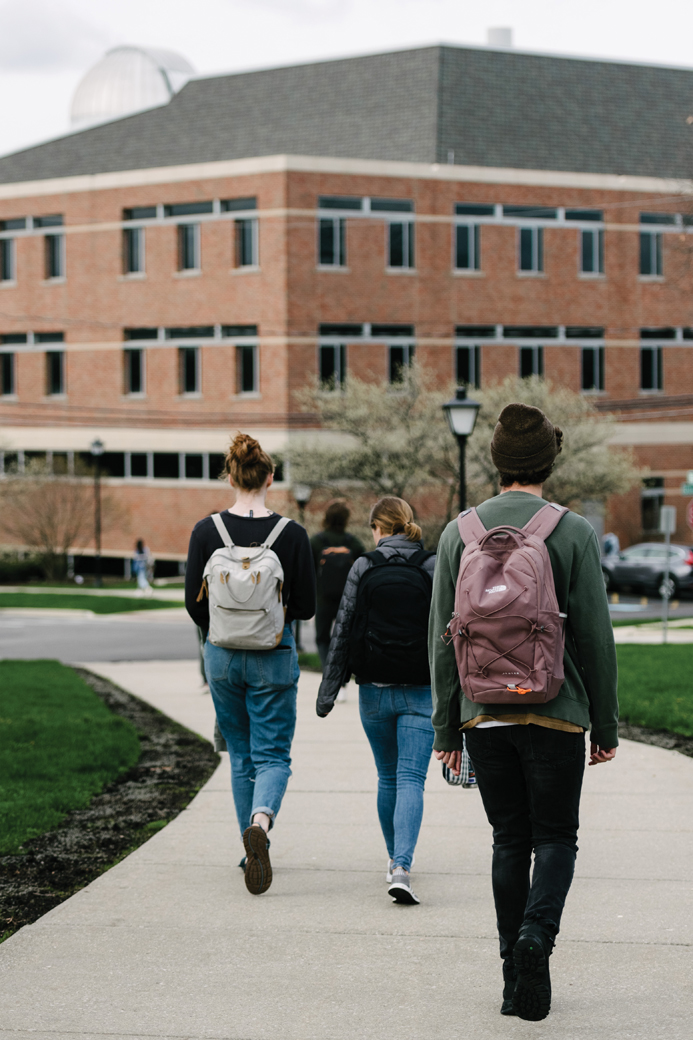
Students on their way to class.
In our information age, when people have unprecedented access to an abundance of information, gaining mere knowledge is not synonymous with education. With the internet available at the tap of an app, when we can type or speak any question into the computer in the palm of our hands and have millions of answers at our fingertips in nanoseconds, access to information is easy. Almost too easy. Gaining understanding, on the other hand, is far less easy. Wisdom is even more difficult to come by. The gap is wide between information access and the ability to discern truth from the clamor of voices and opinions.
A 2022 Pew study found that 95 percent of 13- to 17-year-olds in the U.S. have access to a smartphone. Forty-six percent of U.S. teens say they are online “almost constantly,” and 48 percent say they’re online several times a day. According to the 2022 DataReportal study on global internet usage, the average internet user is online for nearly 7 hours daily. And users spend about two and a half hours daily on social media. Some market researchers estimate that the average American sees 5–10,000 advertisements daily.
These constant internet winds of information blow, and the waves and swells of various ideas, desires, and emotions rise. Even if the information is accessible and ubiquitous, it is not always trustworthy or edifying.
“Because students live in this information age, it’s not like we can actually protect them from ideas,” said Dean of Social Sciences Dr. Bryan McGraw, who often speaks to parents concerned about their students encountering dangerous ideas in college. “Our kids will engage ideas in the world that run counter to what they’ve been raised with and what we as parents believe. The question is: How are they going to engage with those ideas?”
If education is not merely the accumulation of information, and if the current onslaught of information isn’t necessarily trustworthy, the challenge of higher education is to equip people with the tools needed to discern truth as they engage with a wide range of ideas.
“Within the information deluge, it’s important to understand what is valuable, reliable, and credible—to know how to analyze and synthesize that information, and then be able to draw testable, viable, confirmable conclusions,” said Provost Karen An-hwei Lee. “And then, most importantly, we have to ask the ‘so what?’ questions: What do we do with all this? What do we do with it as Christians?”
A Christian education must be able to prepare students to be particular kinds of people.
PREPARATION
College is a time of preparation. Compared to vocations such as marriage or parenthood—which require a lifetime commitment—the calling of “student” is often considered a transition to something else. It’s an in-between stage and, for many, a bridge between adolescence and adulthood. Students often perceive it as a space between what they did and what they will do. McGraw says the most important question, then, is: For what do we think college is meant to prepare us?
In our society, two outcomes are expected of college. For many, college is about acquiring the skills one will need for an eventual career. It’s about landing a good job with good pay to afford the good life they envision. Under this mentality, college is a time of readying oneself for the workforce. Others hold the lofty view that college prepares students to produce knowledge and advance human understanding. Academia itself is typically centered around this aim. “There’s one preeminent goal in most graduate schools: making your university look good by the production of knowledge,” said Dean of Humanities Dr. Jeffry Davis ’83. “That is the goal—the production of knowledge.”

Volumes in Buswell Memorial Library.
But what if college was about more than a career outcome or knowledge for knowledge’s sake?
According to President Philip Ryken ’88, these motivators may be strong, but they aren’t deep or expansive enough to produce real or lasting impact for society or the kingdom. “Those motivations have value, just not the highest value,” he said. Instead, college should provide space for students to grow in “character, understanding of the world, and the person they become in Christ.”
Indeed, as Lee echoes, a job isn’t the sole outcome. Because people are multidimensional, she said, “there is more that we are called to be and to do—for Christ and his Kingdom, and for building up the church and society—than getting jobs, although a meaningful career that combines passion with purpose is frequently a desirable outcome of a Christian liberal arts education.”
Suppose we scratch away the surface-level outcomes of landing a job or having the credentials to prove one’s academic contributions. We’re left with the root goal of developing as a whole person capable of leading through the information deluge.
FORMATION
College is a space where people are formed. Although many students view college as a time to suspend personhood development while they chase after more “technical” or “hard” skills that seem more directly relevant to their career trajectory, ages 18-to-22 are some of the most formative in a young adult’s life, whether they realize it or not.
“Students often have, in the back of their minds, the idea that they can push pause for a while and then re-engage later,” said Professor of Christian Formation and Ministry Dr. David Setran ’92, M.A. ’94, who has observed that delay is common among emerging adults. “It’s easy for students to say, ‘Well, I’ll put that off until later.’ But they don’t realize that what they’re doing now is forming habits shaping them in significant ways. A student’s future is very much determined by what they’re doing now.”
Because formation is inevitable during college, students would do well to approach it with intention. “I think college can be a time of not stowing away deeper issues, but instead engaging those things very intentionally,” said Setran. “I try to set up for students a harvest mentality: of sowing and reaping.”
This reality can be scary: When a college student first leaves the safety and familiarity of home, they enter an arena fraught with decision-making. Who will they be? What will they do?
Dr. Steve Ivester ’93, M.A. ’03, Wheaton’s Dean for Student Engagement, has observed the college years as person-shaping, even as a rite of passage. “College is the place for forming and deepening a sense of identity and purpose in the world, a place for discovery and awakening,” he said. “There’s a transition that happens from the dependence on family—the traditions and liturgies of home—to taking ownership of their own sense of efficacy, their value in the world, who God made them to be, and how they can contribute to his kingdom.”
As Ivester points out, that transition can be messy, and a young adult’s life is understandably filled with mistakes. But college can provide a protected arena for students to test the boundaries of their freedom. Christian liberal arts culture, in particular, more so than other college environments, tends to be more forgiving of that messiness. That, in part, is because of natural mentorship opportunities.
MENTORSHIP
During this “messy” time of autonomy—often a time of disconnection, uncertainty, and relative aimlessness—emerging adults need mentors to bring them strength and to guide them toward positive expressions of their abilities and character. “To emerge healthily into adulthood, you need people who are able to provide examples of what adulthood looks like, people who can guide you through this pathway,” said Setran.
The transition is also one from the mentors of the past—parents, youth pastors, older siblings—to new mentors who will lead the way through the growing pains of career, relationships, and personal spiritual growth. Faculty may appear like mentors because they teach, are typically older, and have more education and life experience. But faculty who will take a vested interest in their students’ holistic lives can be harder to come by at some universities.
As one example, McGraw thinks back to his days as a student at Vanderbilt University, where he connected on a deeper level with his Russian history professor. They were together frequently. McGraw signed up for three different classes with the professor, two independent studies, and a summer of research collaboration on campus. But their relationship did not expand beyond the extent of information transfer. “Not once did I have a meal with him or a cup of coffee,” said McGraw. “Never was I invited to his home.”
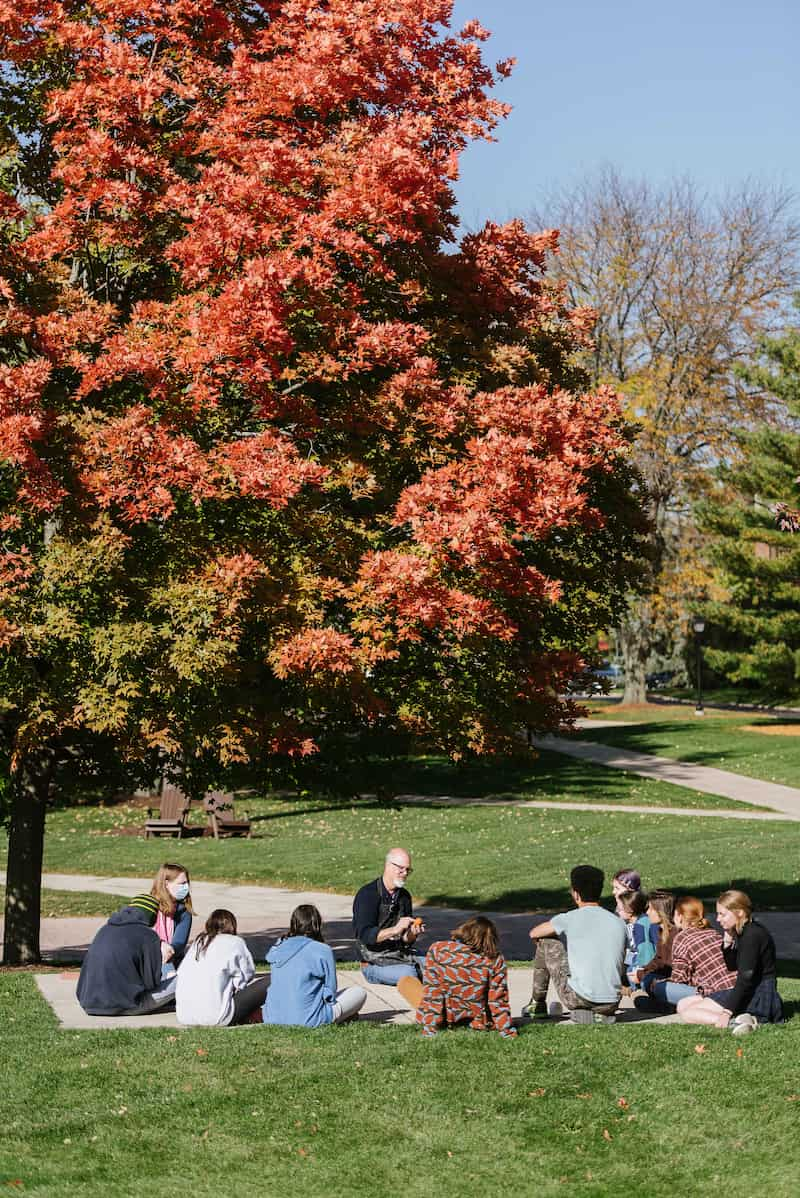
Professor of Art David Hooker teaches class on Blanchard Lawn.
Emerging adults need mentors more than they need information purveyors. At Wheaton, faculty recognize their deeper role in a student’s life during the fleeting undergraduate years. A quick stroll through the dining hall reveals professors sitting down for meals with their students. Faculty set aside additional time in their schedules to help advise student organizations. Faculty office hours are often used for spiritual guidance more than checking on grades or academic outcomes. Many professors are actively involved in church ministries that serve Wheaton students. Still more open their own homes to host students for weekly meals or Bible studies, intentionally building community away from lab work, annotating literature, or performing juries in the Conservatory. For many prospective students, the promise of a transformative Christian community is one of the strongest draws to Wheaton.
There’s a lot at stake here. The environment in which young adults find themselves and the mentors present may well determine their ability to make edifying decisions about their personhood. They often want to feel free to experiment, engage with different ideas, and try on different hats for size. For college students, this experimentation with freedom takes place alongside mentors and friends, within the natural boundaries of an institution, and with predetermined academic responsibilities and standards.
FREEDOM AND INTEGRATION
Living in and learning from the messiness of emerging adulthood is part of what the “liberal” in liberal arts is all about. The liberal arts are rooted in the idea that education should help students develop the skills necessary to be free agents in society. The Christian liberal arts say even more about that agency, knowing that freedom ultimately comes from Christ. “The telos of liberal arts was always to become free,” said Davis.
Davis remembers his time as a Wheaton student, studying with people who were earnest in their devotion to Jesus. “They took seriously the idea that we are made in the image of God and, as free agents by design, we have great potential,” said Davis. That potential is for both good and evil. “Liberal arts education challenges us to think about our potential as free agents who make choices that either move in the direction of worship or in another direction.” Davis said that one of his definitions of Christian liberal arts is “Exploring the depths of freedom in Christ, who is the foundation of all knowledge.”
While students experience the friction of decision-making in the dorm room, the dining hall, or the athletic field—testing the unity of various ideas and ways of life—they are also testing this congruence in the classroom with both grand and ordinary ideas. In this way, the classroom is a place of danger, of adventure. Risk-taking allows students to be confronted by their limitations and inclinations. “I want my classroom contexts to be risky because learning happens when we’re taking risks,” said Davis. “That practice of facing my dark potentiality is vital for my spiritual growth and for the calling of Christ.”
To prepare students to be responsibly free—knowing and managing their capacity for both good and evil—an education must integrate faith and learning. Narrowly specialized information silos limit one’s ability to analyze, synthesize, and evaluate information or discern the truth. The more narrow a course of study or discipline becomes, the less interaction a student has with other ways of thinking and being in the world. In the 1800s, universities developed a divided philosophy of education, each field separate from the others. Although this compartmentalization advanced greater knowledge in fields like medicine, it had consequences. The university lost any substantial unity in curriculum and emphasized disciplinary specialization over holistic education. The primary goal of education became a mastery of a particular domain of knowledge instead of the development of holistic persons ready to participate in wider society.
“This kind of education is information-driven, and the teaching approach is one of faculty downloading information to students,” said Davis.
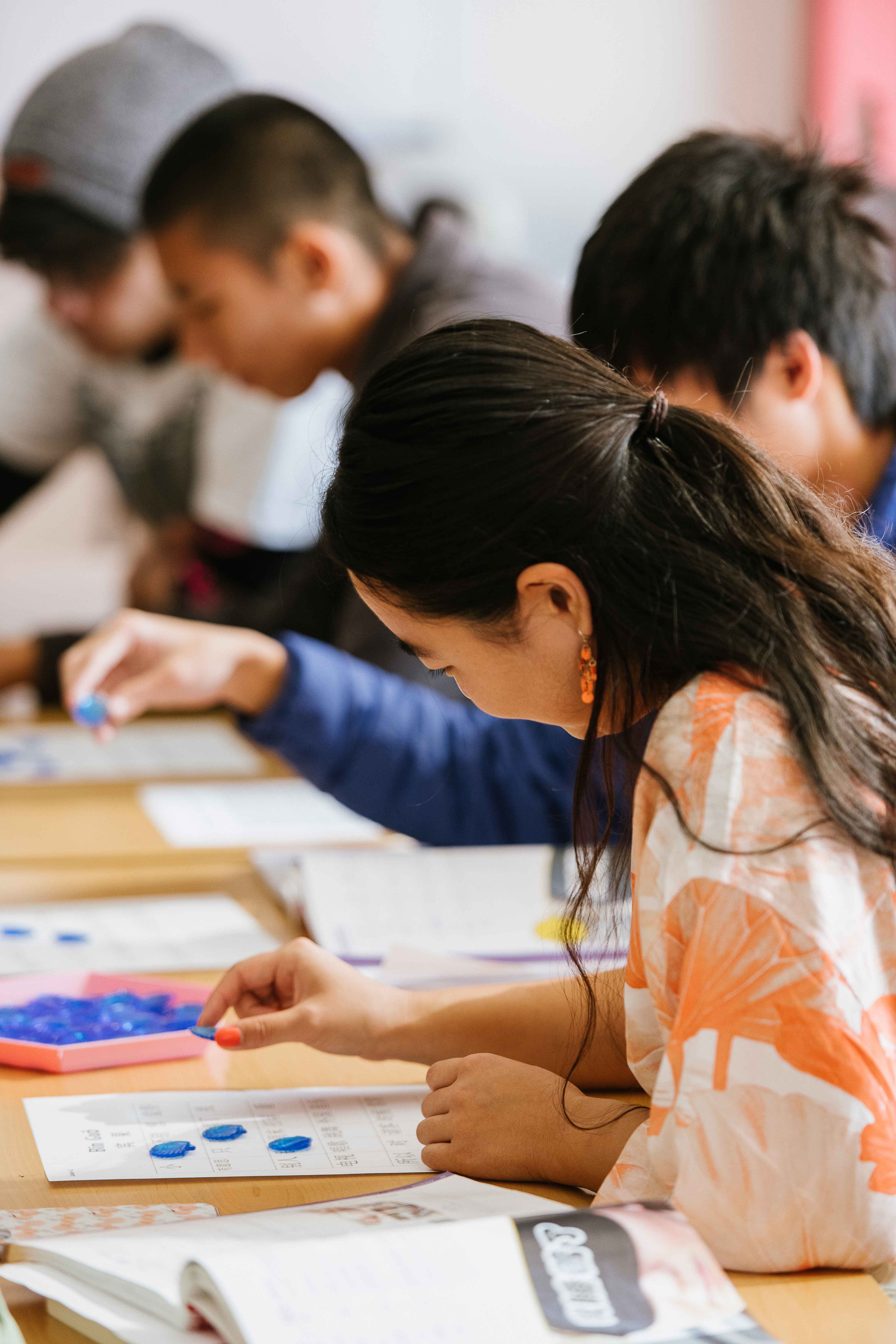
Students studying Chinese language vocabulary in a Wheaton class.
The challenge of disintegration is more acute for Christians. If all things unite under Christ’s authority, then wisdom requires integrating various branches of knowledge. We cannot approach learning in a disintegrated fashion because we know that every good gift comes from God above, that all truth is God’s truth, and that the world is God’s and everything in it. In this way, God is the object of all learning. While expertise in a discipline can be necessary, specialization without integration is dead. “This isn’t just integration of faith and learning, but integration of learning and learning,” said Davis.
At Wheaton, students are given the freedom to explore in a deeply integrated learning and living context. For starters, Wheaton’s curriculum and classrooms are designed uniquely and intentionally to foster interdisciplinary pursuits. Whereas some schools’ general education requirements are simply long lists of classes that don’t have much to do with one another, almost half of the average Wheaton student’s classes are thematically tied to the College’s Christ at the Core general education curriculum. Christ at the Core is distinctive compared to other colleges’ curricula because it is boldly centered on Christ and balances integrated learning with student freedom. The curriculum consists of shared courses and interdisciplinary themes that develop multiple methodological competencies, all centered around Christ.
Yet an educational experience is more comprehensive than curriculum or classroom, and that broader context provides further opportunities to practice faith, skills, and knowledge integration. At Wheaton, to borrow the words of Ivester, “the table is set for integration.” Through athletics, academic clubs, interest groups, outreach ministries, and a plethora of leadership opportunities, students apply what they’re learning in the classroom to activities that impact their personal growth and the collective good of their communities. Students’ academic interests overflow outside the classroom, and they contribute to building a culture of curiosity and hands-on learning that’s integrated even beyond the campus perimeter. The College’s proximity to the local community and bustling metropolitan Chicago flings wide the door for students to apply their learning in real-world contexts. Students also bring their own global experiences, backgrounds, traditions, and ideas to mingle and dialogue on campus, training one another through simple interactions to maintain postures of humble listening and gracious expression.
This integrated learning also allows students the freedom to plumb the depths of issues and ideas in a concerted effort to arrive at truth.
MORALITY
Because of its mooring to truth, Christian liberal arts, at its best, not only avoids but also protects against blind inoculation to a culturally normed or a partisan assemblage of ideas. A person who engages the world from this foundation is unafraid to approach ideological challenges and potentially hairy moral issues with a healthy dose of skeptical openness. As Davis suggests, “a hallmark aim of liberal arts is to make sense of controversial moral issues.”
Every discipline and every course, then, must foreground moral issues. Giving prominence to controversy—even to disturb or disrupt students—compels learners to start thinking about their own values and whether they are consistent with other ideas, practices, or ways of living. People must learn to choose with their freedom what is right instead of what is wrong, and an education that avoids complex, controversial, or taboo moral issues severely neglects the opportunity for young adults to strengthen the muscle of responsible freedom.
Dr. Vanessa Quainoo ’81, Wheaton’s Chief Intercultural Engagement Officer, similarly sees college as a place where those hard-won beliefs are distilled, shared, concretized, and argued. “At some point, a student embraces his or her own set of values,” she said. “That’s why I think Christian education is so crucial to the overall development of one’s sense of rightness or wrongness, conviction, and morality. It’s not just training the mind. It’s also counsel for the soul so that we begin to understand who we are in relation to God.”
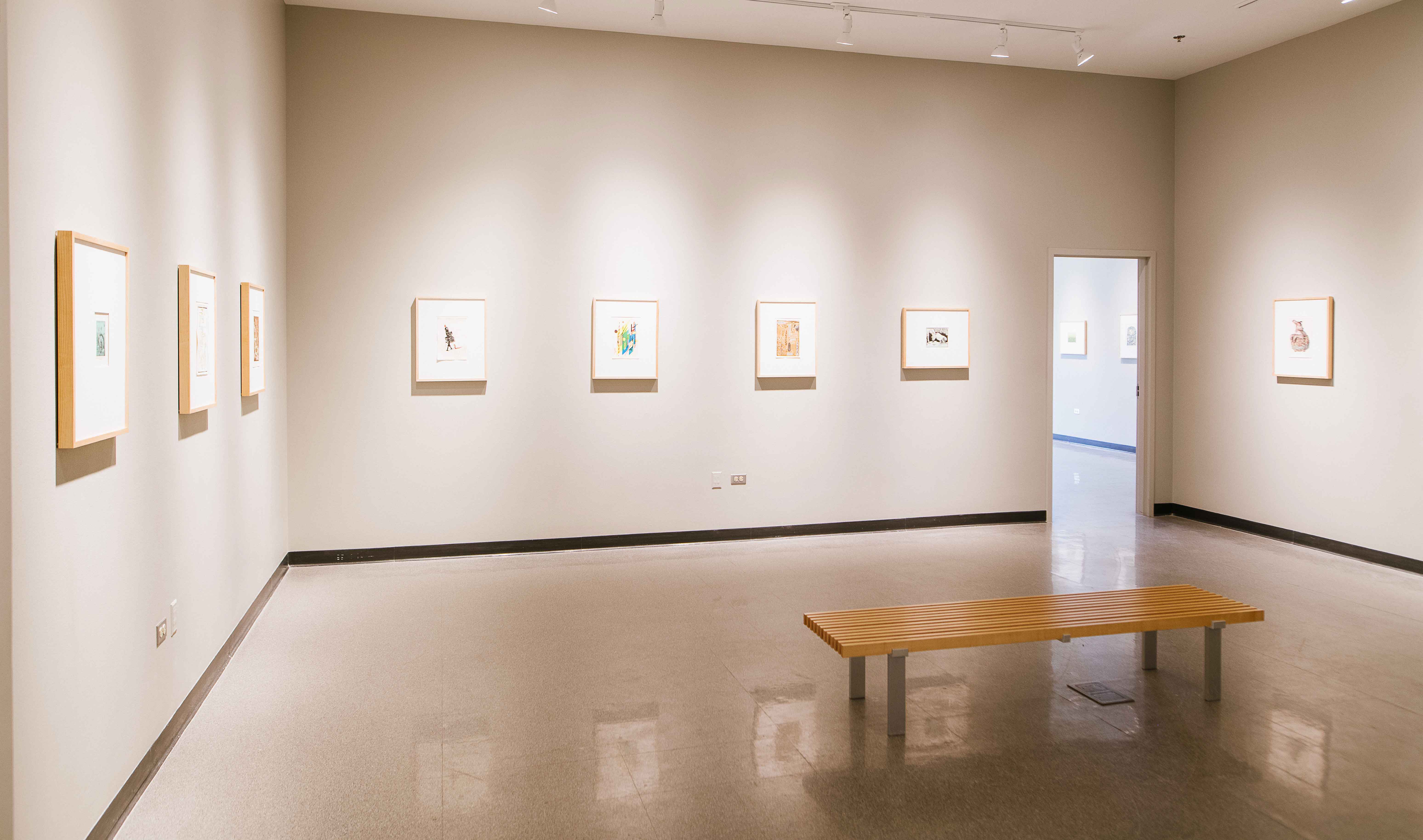
Art galleries in Adams Hall display faculty and student work.
When Davis reviews other professors, he always asks them, “How are you forming students in matters of morality and in matters of consequence with regard to human choice?” And these questions are just as important in disciplines aligned to particular career paths—like business, engineering, nursing—as in those concerned with humanity and society. Lee observes that Wheaton engineering, nursing, and natural sciences students receive this kind of moral education. “They go on to do more than populate a workforce as employees. They lead and shape ideas. They can ask questions like ‘What are the ethics behind this?’ and ‘What are the potential implications of that?’”
COMMUNITY
Yet the reality remains that successfully integrating faith with learning can be a particular challenge for emerging adults, who often encounter a low point in matters of faith as they transition between life stages. Amid such introspective reckoning, it’s paramount that they have a community to walk with them as they wrestle through hard questions.
“Holding orthodox beliefs, having a subjective sense of God’s nearness, feeling that faith is important, and religious practices like reading the Bible, praying, evangelism, singing, and church attendance—all of these hit their very lowest point in a person’s 20s,” said Setran, referring to research on emerging adults. “It is important to be among people who not only believe in the possibility of Christianity but who also show that a life lived for the kingdom is a plausible way to live.”
Setran uses the sociological idea of a plausibility structure—a context within which particular things and not others make sense or are celebrated. In a post-Christendom society—where the way of Jesus is misaligned with the plausibility structure—that kind of community, where emerging adults can develop a resilience of faith, can be hard to come by. At a place like Wheaton, students are surrounded by people grappling with similar issues and earnestly searching for answers. “Students are in community with faculty, staff, and fellow students who genuinely want to know the truth,” said McGraw.
The culture of a college, including what beliefs and practices are presented as plausible, forms a student’s vision and habits for a particular way of life. “We don’t recognize how much we’re formed by the rhythms and practices we engage in day after day,” said Setran.
While these community habits are often tacit, a college culture also may be explicit—created through programming, policies, and people—and thereby directly received by students. “There are these liturgies playing out in the lives of students—praying together, chapel, small groups, Scripture reading—and there’s a cultural language shaping our students,” said Ivester.
College is called “college” because it is a collegium, a community of people gathered for a purpose. This does not mean that the aim is to be sheltered from contact with the world. “Christians aren’t really called to be cloistered, but when we are together, we can help support and encourage one another,” said Lee. “There are some folks out there who say you can attain a liberal arts education by reading a whole bunch of books, especially books by dead people. That really downgrades what we are doing as a community of learners, scholars, mentors, artists, and scientists. It’s something that a single person in a society cannot access on their own.”
When Ryken thinks back on his adolescence, he can trace most of his ideas about college to the concept of shared community. “Everything I ever associated with college was about the community of people who were there,” he said. “They were the people I wanted to be like. Ultimately, it would be about the kind of people they were becoming: serious about the Christian faith and very interested in intellectual pursuits, but also very fun-loving, not taking themselves too seriously. The communal context had a lot of life and vibrancy to it.”
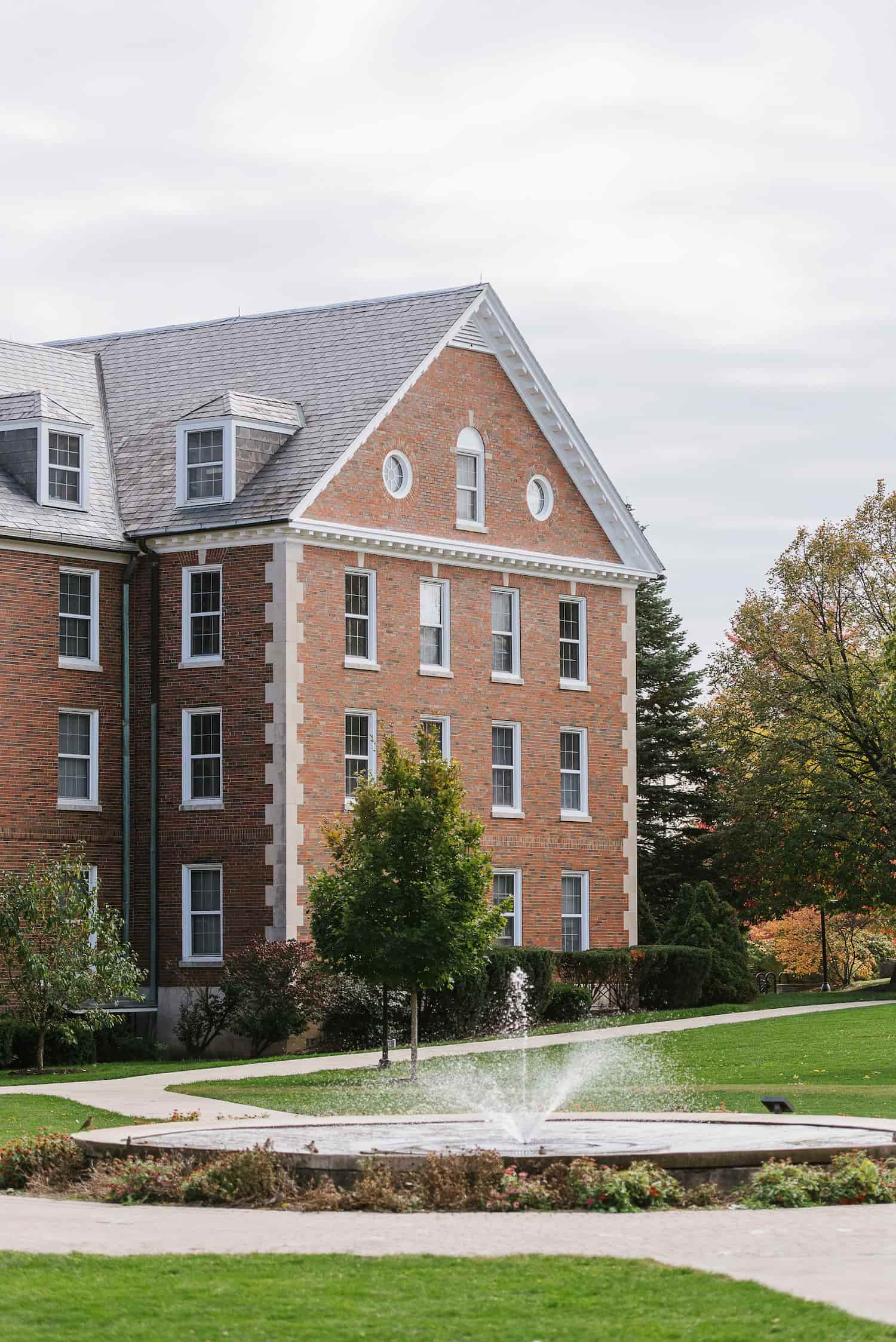
MacEvans Hall, one of Wheaton College’s dormitories for upperclassmen.
Dr. Timothy Larsen ’89, M.A. ’90, who directs Wheaton’s Faith and Learning program for faculty in addition to his professorship in history and Christian thought, thinks of Wheaton College as something like a monastery—a voluntary, residential, covenanted community. “You choose to live here because of the advantages of a shared vision,” he said.
That choice is to be part of a community with shared values. Not all colleges have a published set of shared commitments, but for Wheaton, the Community Covenant is a way of making the culture explicit, of stating a shared vision to be a Christ-centered academic community. Covenanting is a voluntary act of limiting freedom for the sake of a community and one’s own development.
Quainoo says that the difference between Wheaton and secular institutions on this matter is openness about values. “It’s all out front, and we know it,” she said. “We signed on to it, and we agreed to it. Secular institutions have people of great integrity and moral conviction, but their values are often private. The shared values tend to be those of basic civic responsibilities.”
Honesty about a shared moral vision can be unpopular in our society, but it allows for a rich educational environment. In many educational settings, matters of morality are unspoken or privatized, but common commitments enrich educational opportunities. “The more you have common commitments and agreements, the more you have depth and growth and interesting and meaningful disagreements,” said Larsen.
The covenant can be unpopular also because it goes against the grain of our modern culture’s elevation of the self. At Wheaton, the covenant asks members to agree to something beyond oneself. “Our culture is all about what I can get, and that plays out in many college experiences. It’s about me. At Wheaton, it’s about us,” said Dr. Justin Heth M.A. ’07, Dean of Residence Life. “It’s not just about one individual, one faculty member, one student. It’s about all of us as a community seeking Christ.”
The Community Covenant turns the community toward Christ, aligning the College’s educational intent with worship.
Wheaton professors often begin class with prayer, which some may view as superficial or performative. But prayer transforms the environment. It alters the expectations of both professor and student. In prayer, the classroom is no longer a hierarchy of educator and educated, master and apprentice, old and young. Instead, it is a place of mutual learning and discovery. Professor and student are equal under God.
“When a professor prays at the start of class, it’s transformative because it means I, like you, am coming before God,” said Larsen. “The classroom becomes about what we hold in common. In other college environments, my role as a professor would merely be assessing you as a student. That can be soul-destroying. I know people who have gone to very elite universities and have felt like it was all assessment and competition.”
Prayer transforms education into an act of worship. And this aim of Christian liberal arts learning—radical dependence upon God through worshipful learning—transforms a community. In the same way that faculty and students pursue learning together, a worshiping community also creates collaboration among faculty. Larsen’s mentor, Mark Noll, deeply helped him grasp this concept by passing on a Christian liberal arts maxim: “Christian scholarship is collaborative scholarship.”
“The liability of any education is self-reliance,” Davis added. “The aim should not stop at learning or even at integrating faith and learning, because you can do that with self-reliance. Instead, our aim should be to glorify God— to love God with all your heart, soul, strength, and mind, and to love your neighbor as yourself.”
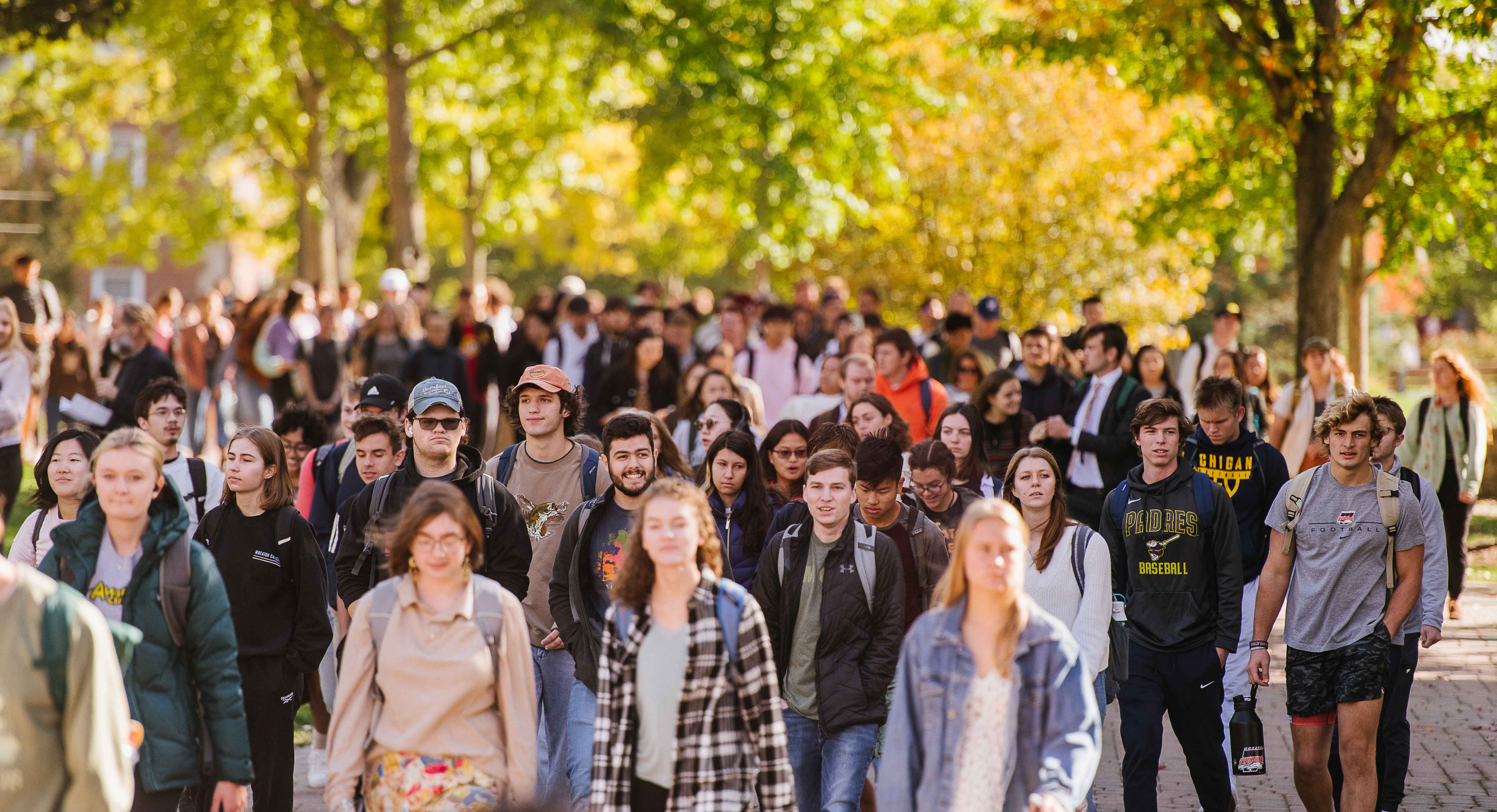
Students on their way to Chapel service.
College is also where this community interdependence is learned in place, in residence. “It’s about your entire life: This is where you eat; this is where you have friends; this is where you worship; this is where you learn; this is where you work out and do athletics; this is where you’re entertained,” said Larsen. COVID reminded many about alternative modes of education, like online college. Larsen says they are an abstraction of college. “Can you just take this bit and have a college?” asked Larsen, who answered, “Well, no. You have access to information, and that learning is valuable. It’s not nothing, but it’s not a transformative experience.” Again, access to information does not transform a person.
Residency affords more than merely a roof over one’s head. With professional staff and trained resident advisers who support students as they navigate life, students develop more than their intellectual capacities. Through the natural challenges of living together and within an educational environment driven toward reconciliation, students leave Wheaton with the skills they need to navigate various aspects of life.
“We don’t just care about our students getting their degree and graduating,” said Heth. “We care about the families they’re going to have, the churches they’re going to be involved with, and the businesses they’re going to run.”
THE END OF COLLEGE
At its simplest, college is an educational community intended to intellectually prepare students for whatever comes next in their lives. In our age of information inundation, college needs to be more than that.
Some colleges are already doing more—preparing students as whole people for the variety of life’s vocations, readied to maintain virtue and to serve something greater than themselves. Wheaton is one such institution: a voluntary, residential, covenanted community practicing worshipful learning that explores the depths of freedom in Christ, who is the foundation of all knowledge.
Although Wheaton has a forward-looking vision “to build the church and benefit society worldwide,” it also stands as a constant amid an ever-more-speedily-changing, information-swollen society.
“It would be absurd if nothing changed. But this is a way of life that has continuity over generations, that values the same things and expresses those values,” said Larsen. “And some of that is embodied in enduring traditions. There is a throughline. And there is something delightful about this continuity over time.”
